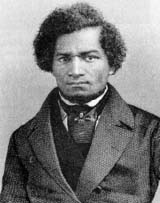
Frederick Douglass as a young man
My long time friend David Beito has unearthed an insightful statement about the relationship of economics and civil rights from Frederick Douglass, a heroic figure and one of the great classical liberals of his age:
The old doctrine that the slavery of the black, is essential to the freedom of the white race, can maintain itself only in the presence of slavery where interest and prejudice are the controlling powers, but it stands condemned equally by reason and experience. The statesmanship of to-day condemns and repudiates it as a shallow pretext for oppression. It belongs with the commercial fallacies long ago exposed by Adam Smith. It stands on a level with the contemptible notion, that every crumb of bread that goes into another man’s mouth , is just so much bread taken from mine. Whereas, the rule is in this country of abundant land, the more mouths you have, the more bread you can put into your pocket, the more I can put into mine. As with political economy, so with political and civil rights (Frederick Douglass, November 17, 1864).
(Note: The penultimate sentence seems garbled to me, and rather than trek to the library to get the volume of Douglass’s papers to check, I’ve asked David to check his copy. If anyone else has easy access, I’d love to know if it’s properly quoted.)
(Further Note: A Commentator has pointed out that I missed two commas in the sentence I found confusing; they are put back in where they should be, but I still find the passage difficult to parse.)
(Yet a Further Note: Well, I had clipped it correctly from the posting, but David Beito later reinserted the commas after I noted the problem in a comment. It’s still not entirely clear what Douglass is getting at with the remark about mouths, though.)










You left out some commas that make it a bit more clear.
‘Whereas, the rule is in this country of abundant land, the more mouths you have, the more money you can put into your pocket, the more I can put into mine.”
Thanks, HLM. You’re right about the commas (I just clipped and pasted, so I don’t know how the commas got dropped), but even with the commas that were present in David’s blog post, it still doesn’t quite make sense to me. I don’t understand how the bit about “the more mouths you have” relates to what follows after that.
Division of labour, perhaps?
David Beito fixed the quotation by reinserting the commas. I think that LB’s suggestion makes the most sense, but it’s a bit of an inelegant way of putting it. If so, it’s tiny fault in the life of a moral and intellectual giant.
Douglass was also a fan of Lysander Spooner, and gave lectures endorsing/defending the arguments in Spooner’s book _The Unconstitutionality of Slavery_.
In fact, it was his endorsement of Spooner’s view of slavery and the Constitution that led to the split between Douglass and William Lloyd Garrison (who argued that the Constitution endorsed slavery, a view that Douglass oiginally held as well).
I think the mystery sentence is a clumsily-worded way of attacking those who think that the amount of wealth and resources available to mankind is fixed and incapable of growth (that “every crumb of bread that goes into another man’s mouth, is just so much bread taken from mine.”).
Douglass goes on to say that the pie of wealth and resources actually grows over time. Population and per capita wealth can both increase (“Whereas, the rule is in this country of abundant land, the more mouths you have, the more bread you can put into your pocket, the more I can put into mine.”).
Looks like the reason Douglass brought that up is to say that if wealth is not fixed and can increase over time, so too can personal freedom. (“As with political economy, so with political and civil rights.”).
Sounds reasonable, I think. Anyone else agree or disagree?
I think the last sentence, while awkward, is essentially grammatical as its stands; I’ve added commas and extra words in brackets to convey what I think it means:
“Whereas, the rule is[,] in this country of abundant land[,] [that] the more mouths you have, the more bread you can put into your pocket [and] the more I can put into mine.”
What’s the mouth mystery? Ryan’s analysis makes sense. It refers to the earlier fallacy that every crumb of bread eaten by one is that much less for everyone else.
It’s a great point made by Smith & Ricardo; I think it was Ricardo who said he hoped for prosperity for England’s enemy, France, because this benefited England. It’s unfortunate that after 200 years we’ve still not been able to make this principle common knowledge.
Great reading, keep up the great posts.
Peace, JiggaDigga